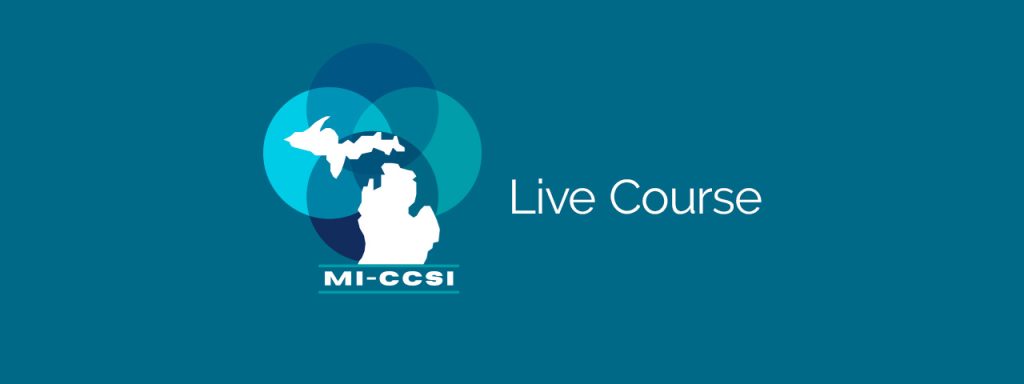

Serious Illness (Palliative Care) Training
Serious Illness (Palliative Care) Training
Optimizing Serious Illness Conversations, Conducting a Comprehensive Assessment and Care Coordination
An evidence-based care approach to assist patients diagnosed with a serious illness.
During this live training course, the participant will learn evidence-based approaches assist patients who have a diagnosis or condition termed as a serious illness.
Training Objectives
At the conclusion of this training course, the participant will be able to:
- Identify the patient’s understanding of their diagnosis and prognosis.
- Apply approaches to broach, identify, and honor the patient’s wishes and values should their condition worsen.
- Build on skills to address patient values and needs.
It is strongly recommended to complete the Team-Based Care and Self-Management Support: Patient Engagement trainings prior to attending this course.
MI-CCSI has been contracted by Blue Cross Blue Shield of Michigan as the training entity for this project.
Registering for Live Training
Course Registration Instructions:
- Create a user profile in the MI-CCSI Learning Management System
- Register for the live training session
- Access course materials & resources
Click to Access MI-CCSI Learning Management System
DATES, TIMES & REGISTRATION
Training Times
8:00 am – 3:00 pm Individual Simulations will occur 3:00-4:30 pm
Audience
The course is intended for all care team members who want to learn more about assisting patients who have a diagnosis or condition termed as a serious illness.
FACULTY
Mary Beth Billie, DNP, RN-BC, CCMMary Beth Billie is a registered nurse with several years of experience developing and managing utilization, case, disease and population health programs in provider and payer organizations. Mary Beth is certified in Case Management from both the CCMC and the AACN. She is an adjunct faculty member in the nursing programs at Benedictine University in Lisle, Illinois and Elmhurst University in Elmhurst, Illinois.
She received her Doctorate of Nursing Practice (DNP) from Loyola University Niehoff School of Nursing. Her Capstone project was implementing a Serious Illness (SI) educational program and Serious Illness Protocol for nurse and social worker case managers in an Accountable Care Organization. Her Serious Illness project was published in the Professional Case Management Journal (Billie and Letizia, 2020).
Mary Beth is a sought-after National Speaker on this important topic presenting her Serious Illness program at the National Case Management, the National Ambulatory Care, and the Center to Advance Palliative Care Conferences. She teaches her Serious Illness Communication course to health care professionals including nurses, social workers, nursing students and physicians across the country.
Her most recent position was the Regional Executive Director of Population Heath at Loyola University Health System in Maywood Illinois where she developed and implemented care coordination and quality management programs for Loyola’s Physician Partners Accountable Care Organization. Mary Beth previously held leadership positions at Blue Cross of Illinois and United Health Care where she was responsible for National Care Management and Population Health programs.
Dr. Ellen Fink-Samnick is an award-winning industry entrepreneur who empowers healthcare’s interprofessional workforce. She is a subject matter expert on Ethics, Health Equity and Quality, Integrated Care, Interprofessional Teams, Professional Case Management, and Trauma-informed Leadership.
Dr. Fink-Samnick has a Doctorate in Behavioral Health with specialization in Health Equity, Integrated Care, Quality, Leadership, and Trauma-Informed Practice, She is a Licensed Clinical Social Worker, Board-certified Case Manager, and Certified Clinical Trauma Professional, as well as a member of the academic honor society, Delta Epsilon Tau.
Dr. Fink-Samnick serves the industry through a variety of roles with academic appointments at Cummings Graduate Institute of Behavioral Health Studies, George Mason University’s College of Public Health, and the University of Buffalo School of Social Work. She is a clinical supervision trainer and instructor for the National Association of Social Workers of Virginia and Metro DC, lead for Rise Association’s Social Determinants of Health Community, moderator of Ellen’s Ethical Lens on LinkedIn, and author of the blog, Ellen’s Interprofessional Insights. She is also a consultant for the Case Management Institute and moderator of their Case Managers Community.
Dr. Fink-Samnick is known for her fierce professional voice. Along with leadership and committee roles across credentialing entities and professional associations, she has served on the Gravity Project and the National Coalition for Social Work and Health. She is a board consultant to the American Association of Doctors of Behavioral Health, and editorial board member for the Professional Case Management Journal, and Case Management Monthly. Further information is available on her LinkedIn Profile.
Carol Robinson DNP, RN, CHPNDr. Carol Robinson is the Founder of So We May Know, LLC. She has 5 years’ experience as an intensive care Registered Respiratory Therapist and 40 years as a Registered Nurse, specializing in critical care and life-limiting illness in both clinical and administrative capacities. She has been nationally certified as a hospice and palliative care nurse since 2001, an End of Life National Education Instructor since 2004, and an advance care planning facilitator since 2012. Her work in community-based advance care planning (ACP) education and facilitation has made Carol a passionate advocate, empowering people to describe #WhatMattersMost to live life well, both now and at end of life. She also educates healthcare providers about the latest tools and resources available to help guide goals of care conversations with their patients.
Sue Vos, BSN, RN, CCMSusan Vos is the Program Director at the Michigan Center for Clinical Systems Improvement (Mi-CCSI). She has experience in working with multi-disciplinary teams to provide care for complex patients, extensive knowledge and expertise in practice transformation, developing and implementing care management curricula based on evidence-based guidelines, training of care manager and other clinical practice staff, implementing care models, and driving quality improvement strategies. She is the current president of the Case Management Society of America: Grand Rapids/Kalamazoo Chapter.
Lynn Klima, DNP, APRN, CNE, ANP-BCDr. Klima is an adult nurse practitioner with over 40 years of experience across acute, primary care, and community-based settings. She obtained her Doctorate in Educational Leadership in 2018 from American Sentinel University and is a Certified Nurse Practitioner through the American Nurse Credentialing Center and a Certified Nurse Educator through the National League of Nursing. Across the last 14 years, she has been an academic associate nursing professor with a teaching focus on nursing leadership, therapeutic communication, community health, geriatrics, and hospice/ palliative care at the graduate and undergraduate levels.
Her work history includes executive leadership responsibilities that focused on leadership development, performance improvement, care management delivery models, and care coordination initiatives to support the complex chronically ill.
Dr. Klima is dedicated to engaging staff in care delivery improvements. Her doctoral research focused on understanding how to support nurses in engaging patients in providing self-management support to their patient populations. Her primary interests as an implementation scientist include integrating evidence-based practices that focus on patient safety, transition management, patient-centered care, and leadership development across care settings.
Cost
FREE for members; FREE for non-members
This training is provided at no cost to the participant through a contract with BCBSM.
Continuing Education Credits
Providers & Nurses
The AAFP has reviewed Serious Illness Training, and deemed it acceptable for AAFP credit. Term of approval is from 03/04/2025 to 03/03/2026. Physicians should claim only the credit commensurate with the extent of their participation in the activity.
Contact Hours Approved: 6.25 for attending the entire session
Nurses can use the CME for their state requirements. Information on this can be found on LARA and through the Michigan Nurse Association (MNA) at Michigan Board of Nursing Continuing Education Requirements Details
Social Workers
This course is approved by the NASW-Michigan
Approval Code: 021524-02
Contact Hours Approved: 6 for attending the entire session.
Full continuing education credits are achieved by the successful participation and completion of the live training course and all required evaluations.
Submit continuing education credit questions to Sue Vos at 616.292.5774 or sue.vos@miccsi.org
TRAINING MATERIALS & COURSE PREPARATION
All course resources may be accessed HERE.
Questions
If you have any questions about this training, contact Sue at sue.vos@miccsi.org or Amy at amy.wales@miccsi.org.